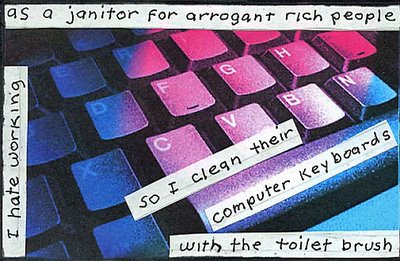 Today's society is controlled by our technologies whether they are accessed by mobile phones, computers, or tablets. What if the technologies that we use, that mainly rely on the Internet, suddenly were censored? This has been a disheartening question and topic that has been recently discussed throughout the past few months through the SOPA and PIPA acts. With the formation of these acts came massive uproar from many protestors and even more recently by hacktivists groups. The definition of a hacker is one who enters into an unauthorized computer database. Hackers have been around for years but not until recently have they ever made such a massive impact on society by creating cultures among themselves. The main group that has been found all over the controversial topic of censorship is known as "Anonymous." After looking deeper into the hacktivism culture I instantly found this aggressive hacktivist group, Anonymous, and was shocked, and still am shocked, that I had never heard of these protestors much less seen any of their messages. So for those who have been living under a rock with me, here is a brief trailer of what the Anonymous group has done and what they stand for.
Today's society is controlled by our technologies whether they are accessed by mobile phones, computers, or tablets. What if the technologies that we use, that mainly rely on the Internet, suddenly were censored? This has been a disheartening question and topic that has been recently discussed throughout the past few months through the SOPA and PIPA acts. With the formation of these acts came massive uproar from many protestors and even more recently by hacktivists groups. The definition of a hacker is one who enters into an unauthorized computer database. Hackers have been around for years but not until recently have they ever made such a massive impact on society by creating cultures among themselves. The main group that has been found all over the controversial topic of censorship is known as "Anonymous." After looking deeper into the hacktivism culture I instantly found this aggressive hacktivist group, Anonymous, and was shocked, and still am shocked, that I had never heard of these protestors much less seen any of their messages. So for those who have been living under a rock with me, here is a brief trailer of what the Anonymous group has done and what they stand for.
Anonymous is a group that is forming and growing through the world. They stand up and fight for the freedom of speech and the freedom to use the Internet without censorship. The group not only speaks and protests for what they believe in but acts upon their beliefs. Anonymous aggressively forces people to take notice in what some would say as illegal and questionable approaches.
Most recently, Anonymous ferociously put themselves on the world's radar after the shut down of the most popular file sharing website, MegaUpload. This take down of MegaUpload represented the government acting on copyright laws. It was the most publicized shut down and began the censorship uproar. Anonymous' retaliation to the destruction of this file sharing website was what got them noticed in late January of this year. This revenge included successfully hacking into websites such as the Department of Justice, Motion Picture Association (MPAA), Recording Industry Association of America (RIAA), the Universal Music Group, and many more. Not only has the hacktivist group shut down multiple websites and databases but they have also stolen hundreds of security information including credit card numbers.
 In December of 2011, Anonymous gathered credit card information from a global intelligence company, Stratfor, who supposedly failed to encrypt their client information. Along with credit card information was personal emails that were stolen, some even forged, and then published without consent. Anonymous used this personal information obtained to make numerous contributions to charities such as the American Red Cross, CARE, and Save the Children. The donations that were unwillingly donated summed up to be around $1 million. Anonymous has definitely made their opinions known and seems to be here to stay.
In December of 2011, Anonymous gathered credit card information from a global intelligence company, Stratfor, who supposedly failed to encrypt their client information. Along with credit card information was personal emails that were stolen, some even forged, and then published without consent. Anonymous used this personal information obtained to make numerous contributions to charities such as the American Red Cross, CARE, and Save the Children. The donations that were unwillingly donated summed up to be around $1 million. Anonymous has definitely made their opinions known and seems to be here to stay.
The illegal act of hacking is extremely difficult for authorities to try and prevent considering the crime scene is in cyberspace and not a physical room one can just walk into. With technology, a thief can steal from someone without even being in the same geographical place. Theft is not a new crime but with the Internet it redefines the act. The re-creation involves a larger extent of reach of the theft, the degree of damage, the increased visibility the Internet provides, and the actual operation itself. Anonymous took every advantage that the Internet has to offer to create the most damage with an unlimited audience.
The question revolving around hacktivism is where should the line be drawn and if there should even be a line. Did Anonymous go too far in attempt to be heard? Should there be censorship laws?






